
How far will an aspiring writer go to see his screenplay turned into a celluloid blockbuster? How far will a film producer go in seeking same-sex pleasures behind his “understanding” wife’s back? How far will a Hollywood Wife go after finding out steamy details of her husband’s infidelity with another man? Playwright Craig Lucas answers these questions … and quite a few more … in his provocative psychological thriller The Dying Gaul, now getting an almost perfect revival at Santa Ana’s Theatre Out.
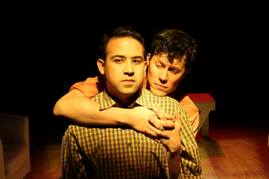 Set in 1995, the year before protease inhibitors transformed HIV/AIDS from a death sentence into something considerably less life-threatening, The Dying Gaul introduces us to Robert (Jeffrey Fargo), a writer in his mid-thirties who, following the death of his lover Malcolm to AIDS, has written a screenplay based both on their life together and on Malcolm’s death. Handsome Hollywood studio exec Jeffrey (Chris Carver) is willing to pay Robert $1,000,000 for the film rights on one condition, that Robert change the lead couple from gay to straight. His reasoning: “Most Americans hate gay people. If they hear it’s about gay people, they won’t go.” Making the leads heterosexual goes against all of Robert’s principles and his promise to Malcolm, but seduced by the money, he agrees.
Set in 1995, the year before protease inhibitors transformed HIV/AIDS from a death sentence into something considerably less life-threatening, The Dying Gaul introduces us to Robert (Jeffrey Fargo), a writer in his mid-thirties who, following the death of his lover Malcolm to AIDS, has written a screenplay based both on their life together and on Malcolm’s death. Handsome Hollywood studio exec Jeffrey (Chris Carver) is willing to pay Robert $1,000,000 for the film rights on one condition, that Robert change the lead couple from gay to straight. His reasoning: “Most Americans hate gay people. If they hear it’s about gay people, they won’t go.” Making the leads heterosexual goes against all of Robert’s principles and his promise to Malcolm, but seduced by the money, he agrees.
Jeffrey is married with children, but we soon come to realize that he may not be as devoted to his wife Elaine (Lori Kelley) as Robert was—and still is—to Malcolm. At the end of their first interview, the Hollywood bigshot hugs Robert and whispers, “You are very handsome. And I’m getting a little turned on. Are you?”
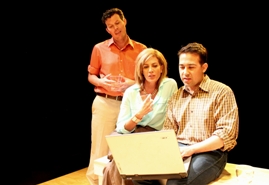 Soon, the two men are carrying on an affair behind Elaine’s back, though Jeffrey assures Robert that his wife knows that “I like men.” Robert’s sex drive, meanwhile, remains as high as ever, if not higher, and with Jeffrey possessing wealth, power, and looks, it’s no wonder that Robert allows himself to be seduced.
Soon, the two men are carrying on an affair behind Elaine’s back, though Jeffrey assures Robert that his wife knows that “I like men.” Robert’s sex drive, meanwhile, remains as high as ever, if not higher, and with Jeffrey possessing wealth, power, and looks, it’s no wonder that Robert allows himself to be seduced.
It is a mention of chat rooms (fairly new in 1995) that sends a fascinated Elaine to visit the room in which Robert most often chats, and she strikes up a conversation with him in the guise of a gay man. When Robert lets slip that he is carrying on an affair with a married man whose wife has become a good friend, Elaine realizes the truth and sets off on a path whose malice and cruelty are shocking … and will have profound effects not merely on Jeffrey and Robert’s lives but on her own as well.
In The Dying Gaul, no one comes out unscathed.
Theatre Out co-founder David C. Carnevale directs this second production of TO’s 2014 season with a combination of assurance, attention to dramatic detail, and visual flair, and he is rewarded in his endeavors by a trio of powerful lead performances.
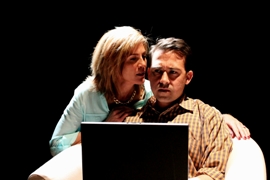 Fargo, set to reprise his Scenie-winning Best Lead Actor performance in Theatre Out’s upcoming Corpus Christi, is a marvel as the tormented Robert. About the actor’s earlier performance, I described Fargo as having “the indefinable something called talent that commands an audience’s attention and wins their hearts,” qualities that serve him well in The Dying Gaul. Fargo creates a Robert who has us on his side from the get-go and aching for him as finds himself trapped in the spider’s web being woven around him. Simply put, this is as richly layered and consistently “watchable” a performance as I’ve seen at Theatre Out.
Fargo, set to reprise his Scenie-winning Best Lead Actor performance in Theatre Out’s upcoming Corpus Christi, is a marvel as the tormented Robert. About the actor’s earlier performance, I described Fargo as having “the indefinable something called talent that commands an audience’s attention and wins their hearts,” qualities that serve him well in The Dying Gaul. Fargo creates a Robert who has us on his side from the get-go and aching for him as finds himself trapped in the spider’s web being woven around him. Simply put, this is as richly layered and consistently “watchable” a performance as I’ve seen at Theatre Out.
Carver, seen previously in Theatre Out’s The Violet Hour, does terrific work too as the sexually ambiguous, increasingly tormented Jeffrey, in addition to generating considerable fireworks with Fargo in the play’s more provocative moments. (Watching Carver as he switches effortlessly from dirty talk—“I want to lick you from head to toe”—to all-business when Elaine enters the room is a particular treat.)
Theatre Out favorite Kelley may have the toughest assignment of all as a woman trapped between two lovers, since Lucas leaves it up to the actress playing Elaine to determine what motivates her malevolence. Fortunately, Kelley proves herself up to the task, creating a character who grabs our attention and earns our sympathy even as we gasp at the fury of a woman scorned.
Only Michael Treat Latsch’s weak performance as Robert’s therapist, one that consists of overly dramatic line readings and not much more, prevents Theatre Out’s latest from being an all-around triumph for Carnevale and fellow co-founder Joey Baital.
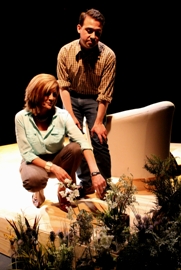
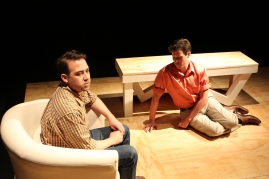
What is an unqualified success is The Wonder Duo’s production design, beginning with a set that is both simple (a couple of armchairs, a bench, and a hardwood floor in an otherwise blackbox setting) and elegant, and one that allows our imagination rather than time-consuming scene changes to transform it from locale to locale. Carnevale and Baital light their scenic design with dramatic flair, the costumes they have come up with for each character proving pitch-perfect choices as well. Best of all is a cinematic musical underscoring which subtly ups the suspense at every dramatic turn. My only suggestion would be to conclude the production with a single actor onstage and a single spot on the image of the Dying Gaul statue that he conjures up, a dramatic fadeout that would make for one wallop of a climax.
The Dying Gaul is produced by Baital and Carnevale. EB Bohks is stage manager.
Much has changed since Lucas wrote The Dying Gaul. Jeffrey and Robert could scarcely have imagined a Hollywood blockbuster like Brokeback Mountain, let alone that Gus Van Sant would film “the gay Malcolm X” with his Oscar-winning Milk. A play that was as contemporary “as today’s chat rooms” has become a period piece in less than twenty years.
What hasn’t changed is this. The Dying Gaul makes for both gripping drama and ample food for conversation and thought on the way home from the theater—and you can’t ask for much more than that.
Theatre Out, 402 W. 4th Street, Santa Ana.
www.theatreout.com
–Steven Stanley
March 7, 2014
Photos: David C. Carnevale
Tags: Craig Lucas, Orange County Theater Review, The Dying Gaul, Theatre Out


 Since 2007, Steven Stanley's StageSceneLA.com has spotlighted the best in Southern California theater via reviews, interviews, and its annual StageSceneLA Scenies.
Since 2007, Steven Stanley's StageSceneLA.com has spotlighted the best in Southern California theater via reviews, interviews, and its annual StageSceneLA Scenies.







 COPYRIGHT 2025 STEVEN STANLEY :: DESIGN BY
COPYRIGHT 2025 STEVEN STANLEY :: DESIGN BY